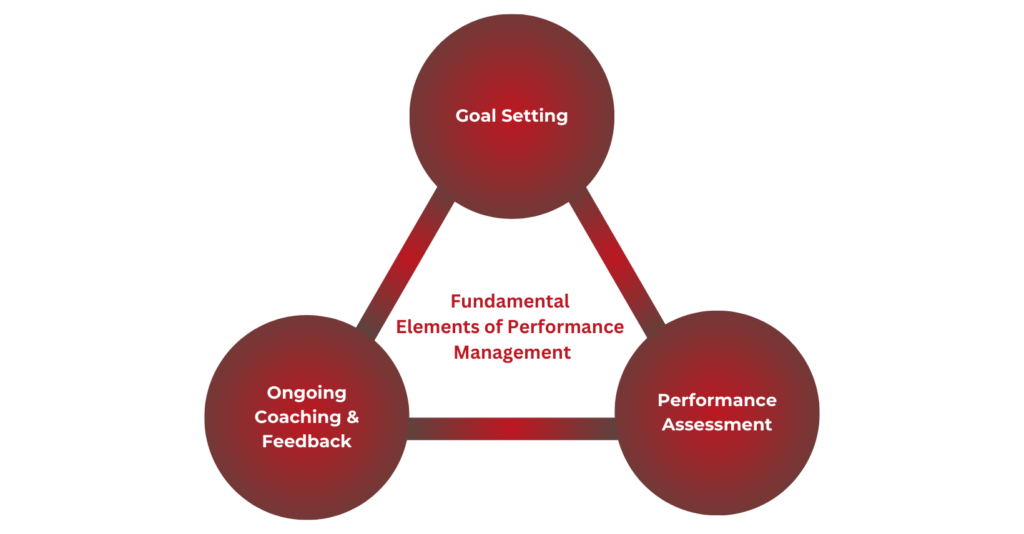Organizations aiming to accomplish objectives and maintain a competitive edge in the contemporary, fast-paced business landscape must implement efficient performance management systems. We, at Shamalie Consulting, recognize the significance of implementing effective performance management strategies that increase employee engagement, productivity, and the overall success of your organization. This exhaustive guide aims to explore the complexities of performance management and offer organizations practical insights to enhance their approach.
A comprehension of performance administration
Performance management comprises the methodologies, structures, and resources that institutions employ to measure, track, and enhance the performance of their personnel. It entails establishing unambiguous objectives, delivering consistent feedback, assessing performance, and pinpointing areas that require improvement.
The Importance of Performance Management to the Success of an Organization
Effective performance management is critical to the profitability of an organization. Through the process of aligning individual goals with organizational objectives, performance management guarantees that each employee is actively involved in the realization of overarching business goals. By promoting accountability, transparency, and ongoing development, it cultivates an environment that stimulates innovation and performance throughout the entire organization.
Fundamental Elements of Performance Management

A. Goal Setting
Establishing goals and objectives that are both explicit and attainable constitutes the initial phase of efficient performance management. By adhering to the SMART framework (specific, measurable, attainable, pertinent, and time-bound), objectives furnish personnel with a strategic direction and direct their endeavors toward intended results.
B. Ongoing Coaching and Feedback
Consistent feedback and mentoring are imperative for the growth and enhancement of employee performance. Managers must furnish employees with constructive and timely feedback to facilitate their comprehension of their strengths, areas requiring refinement, and advancement toward objectives. Coaching sessions provide prospects for the advancement of one’s career, the improvement of skills, and the refinement of objectives.
C. Performance Assessment
A formal process for evaluating employee performance to predetermined objectives and anticipations is through performance evaluations. By employing objective evaluation criteria and performance metrics, organizations can discern exceptional performers, acknowledge accomplishments, and proactively rectify performance deficiencies.
Principles of Excellence in Performance Management

I. Establish Unambiguous Expectations
Effectively conveying expectations is critical when it comes to performance management. Employees should comprehend what is expected of them, how their performance will be evaluated, and the consequences of meeting or exceeding expectations.
II. Encourage an Environment of Constant Feedback
Encourage managers and employees to engage in candid and transparent dialogue. Establish mechanisms that facilitate continuous feedback and dialogue, enabling personnel to inquire about matters of clarification, voice concerns, and obtain immediate assistance.
III. Invest in the Development of Employees
An investment in the development of employees signifies a dedication to fostering their progress and achievement. Facilitate access to opportunities for mentoring, training, and professional development that augment competencies, expertise, and capacities.
In conclusion, in the current competitive business environment, organizational success is contingent upon the implementation of efficient performance management. Through the implementation of comprehensive performance management strategies, organizations can synchronize the endeavors of individuals with strategic goals, cultivate an environment that demands responsibility and ongoing enhancement, and enable personnel to achieve their utmost capabilities. We are dedicated to assisting organizations in optimizing their performance management processes and attaining their business objectives at [Your Company Name]. To learn more about our innovative solutions and how we can assist with your performance management initiatives, please contact us immediately.
Frequently Asked Questions
On what frequency ought performance evaluations to be carried out?
It is optimal to conduct performance evaluations at regular intervals, such as annually or biannually. However, the frequency may differ based on the requirements and preferences of the organization.
What actions ought managers to take if an employee’s performance fails to meet anticipated levels?
When an employee’s performance fails to meet anticipated standards, it is the responsibility of managers to promptly rectify the situation by providing constructive feedback, guidance, and support. It is critical to identify the root causes of performance issues and devise a plan for improvement in collaboration with the employee.
How can the efficacy of an organization’s performance management strategies be evaluated?
The efficacy of performance management strategies can be assessed by organizations using a range of metrics, such as employee engagement, productivity, retention rates, and the attainment of strategic goals. Consistent input from both employees and managers can yield significant knowledge regarding the effectiveness of performance management endeavors.
To what extent do employees contribute to the process of performance management?
Employees engage in the performance management process by establishing objectives, providing input, and actively participating in discussions regarding their performance. By assuming responsibility for their performance and growth, personnel foster an environment that emphasizes ongoing enhancement and liability.
In what ways can performance management enhance employee morale and engagement?
Effective performance management enhances employee morale and engagement through the provision of transparent expectations, acknowledgment of accomplishments, avenues for professional development, and a culture that values constructive feedback. Engagement and motivation to achieve optimal performance are positively correlated with employees’ sense of worth, autonomy, and investment in their achievements.
